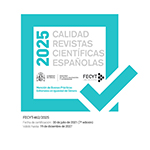"El hechizado por fuerza" (1698) como proyecto social: sobre versiones hacia la modernidad
Resumen
El presente trabajo analiza la importancia que tuvo la regeneración social en la comedia de figurón El hechizado por fuerza (1698) de Antonio de Zamora, además de esclarecer la datación de la pieza. La preocupación por censurar vicios y malas costumbres populares evidencia el peso ideológico aperturista de un teatro de entre siglos como condicionante para la escritura teatral hacia la modernidad. Para ello se utiliza una técnica dramatúrgica que armoniza la actualización de la comedia anterior y la asimilación del teatro extranjero —como en el caso de Duendes hay alcahuetes y espíritu foleto (1709) o el propio El hechizado por fuerza—.
Descargas
Descarga artículo
Licencia
La revista Dicenda. Estudios de lengua y literatura españolas, para fomentar el intercambio global del conocimiento, facilita el acceso sin restricciones a sus contenidos desde el momento de su publicación en la presente edición electrónica, y por eso es una revista de acceso abierto. Los originales publicados en esta revista son propiedad de la Universidad Complutense de Madrid y es obligatorio citar su procedencia en cualquier reproducción total o parcial. Todos los contenidos se distribuyen bajo una licencia de uso y distribución Creative Commons Reconocimiento 4.0 (CC BY 4.0). Esta circunstancia ha de hacerse constar expresamente de esta forma cuando sea necesario. Puede consultar la versión informativa y el texto legal de la licencia.









